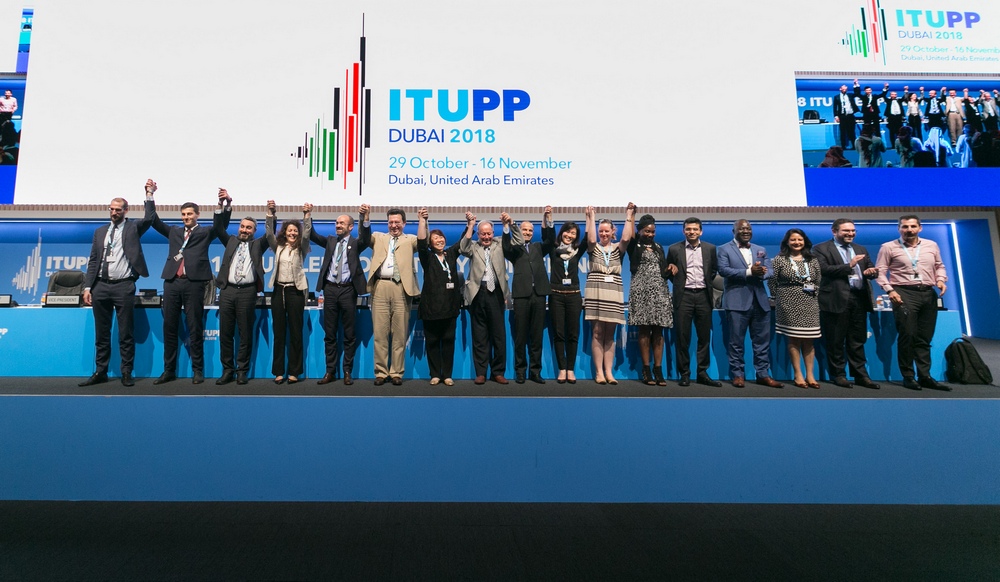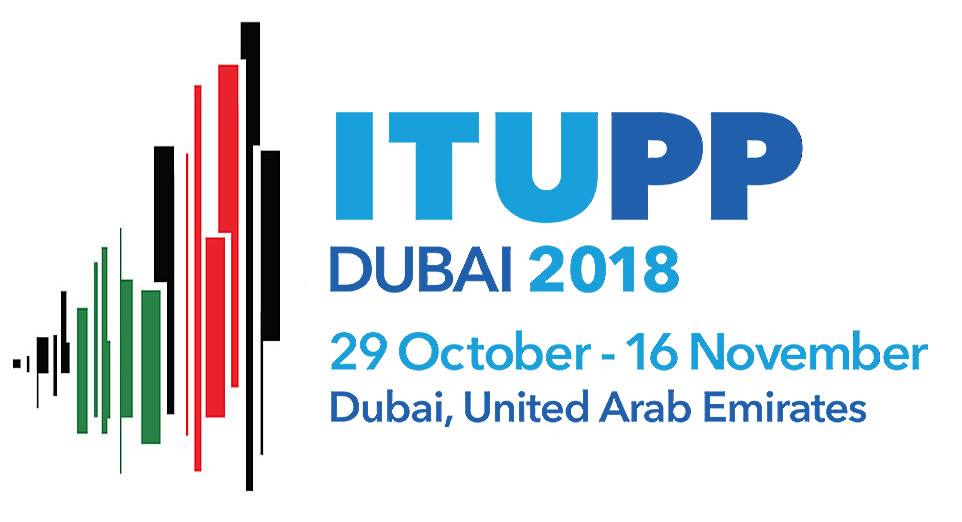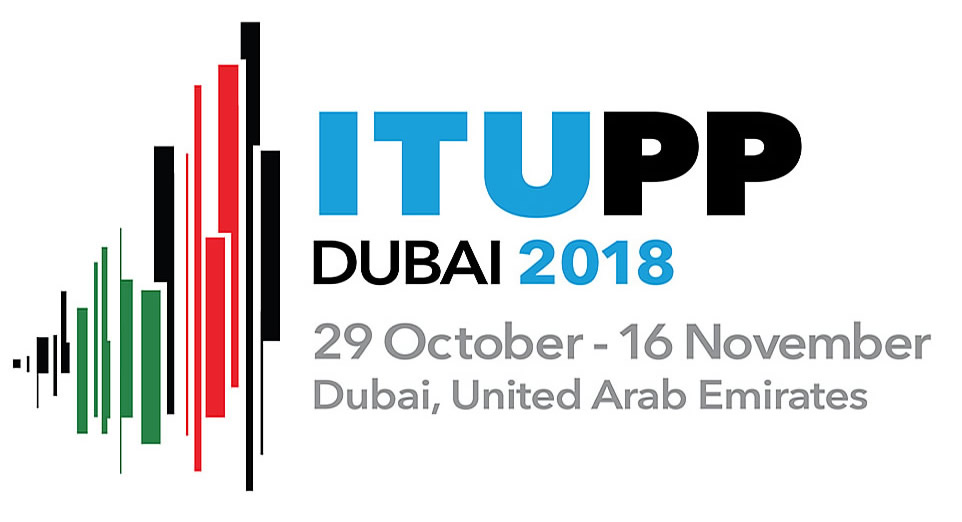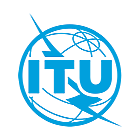In the early morning of the final day of the ITU Plenipotentiary Conference 2018, delegates agreed on a number of key resolutions.

Facilitating the Internet of Things and smart sustainable cities
ITU Member States have approved a revised resolution to strengthen ITU’s work relating to the Internet of Things (IoT) and smart sustainable cities and communities.
IoT – referring to the network of rapidly growing computing devices with built-in sensors and software to connect with each other and share data – enables billions of devices and objects equipped with smart sensors to connect with each other, collect real-time information and send this data, via wireless communication, to centralized control systems. These, in turn, manage traffic, reduce energy usage and improve a wide range of urban operations and services. Recent IoT developments are driving and supporting the development of smart sustainable cities throughout the world.
Considering that a globally connected “IoT” world will be built on the connectivity and functionality made possible by telecommunication networks – and that relevant ITU Study Groups as well as industry fora, consortia and other standard development organizations (SDOs) are working on development of various standards and/or technical specifications for IoT – ITU Member States agreed on ITU strengthening its work in these areas.
The revised resolution resolves to promote investment in and development of IoT in order to support the goals of the United Nations 2030 Sustainable Development Agenda – and to continue and further develop studies and activities on IoT and Smart Sustainable Cities and Communities (SSC&C).
The revised resolution also instructs ITU to support the work of relevant study groups and to continue cooperation with relevant organizations, including SDOs, for exchanging best practices and disseminating information to increase interoperability of IoT services, through joint workshops, training sessions, joint coordination activity groups and any other appropriate means.
Bridging the digital divide
ITU Member States have approved a revised resolution on the use of telecommunication/information and communication technologies (ICTs) to bridge the digital divide.
ICTs now help billions improve access to education, healthcare, mobile banking – and more. This is vital for progress on the 17 United Nations Sustainable Development Goals.
Yet, half the world’s population is still unconnected. The ITU is assisting countries to raise awareness and develop their policies, regulations and business practices to promote innovative, affordable and relevant services and content, encourage investment, develop public-private partnerships and promote digital inclusion.
The resolution recognizes that the benefits of advancement in ICTs can create opportunities for digital services in developing countries and enables digitization of the infrastructure that underpins today’s digital economy. It also recognizes that implementing policies that promote access to telecommunication/ICT services in rural, isolated and underserved areas has proven to be a crucial tool to bridge the digital divide.
ITU Member States resolved that ITU, in cooperation with relevant organizations, should continue its task of preparing adequate ICT reference indicators for measuring the digital divide, collecting statistical data, measuring the impact of ICTs and facilitating a comparative analysis of digital integration, which will continue to be a fundamental need in support of economic growth.
In the revised resolution, Member States also instruct ITU to continue to assist Member States and Sector Members in developing a policy and regulatory framework for ICTs and ICT applications that favour development. They also instruct ITU to compile and disseminate best practices and regulatory experiences on national and regional strategies used to promote investment in telecommunications/ ICT infrastructure and services in unserved and/or underserved areas.
Building confidence and security in the use of ICTs
ITU Member States have approved a revised resolution on strengthening the role of ITU in building confidence and security in the use of information and communication technologies (ICTs).
The number, severity and diversity of cyber-threats and -attacks have increased as our societies become more dependent on the Internet and ICTs. Recent years have seen a massive proliferation of different types of attacks – from worms and viruses automated by botnets, to Distributed Denial of Service (DDoS), ransomware and malware.
Cyber-threats and -attacks give rise to ever-growing security challenges for both the public and private sectors in all countries. Cybersecurity-related incidents can compromise the availability, integrity and confidentiality of information transiting on networks and disrupt the operations and functioning of critical infrastructure.
ITU Member States have resolved to promote a culture in which security is seen as a continuous and iterative process, built into products from the beginning and continuing throughout their lifetimes, and is accessible and understandable for users.
They also agreed to support the standard-setting activities of ITU by promoting and facilitating the implementation of approved security-related ITU recommendations especially from developing countries.
The resolution reaffirms the importance of the ITU as a relevant player in facilitating international cooperation and, through its Global Cybersecurity Agenda (GCA), resolves to promote awareness on ITU activities and those of other relevant organizations, and to foster collaboration and support Member States through capacity-building efforts.
Member States are invited to raise awareness of the importance of strengthening cybersecurity among organizations and individual users including the implementation of basic safeguards, and to promote the development of educational and training programmes to enhance user awareness of risks in cyberspace and the steps that users can take to protect themselves.
Assisting Member States to combat and deter mobile device theft
ITU Member States updated a resolution to combat and deter mobile device theft, and assist governments and regulators with monitoring, data and the exchange of best practices on the issue.
As mobile phones have become increasingly central to our lives, their theft and loss are becoming more serious. High-end mobile devices may be deliberately targeted by thieves for their desirability and ease of access. In reality, much of the real value of a phone may reside in its personal data, contact directory and photos or videos of sentimental value. Stolen and lost phones can result in the loss of important and valuable data that may never be recovered (such as photos), and can also result in identity theft and fraud.
Cell phone protection tools and regular back-ups are vital. Operators and manufacturers are already developing sophisticated security features on phones (e.g. apps that trace the location of a stolen handset and can block its use remotely) and remote data-erasure tools.
Governments, national statistical offices and telecom/ICT regulatory agencies are exchanging best practices and launching awareness campaigns.
The revised resolution now calls on Member States and Sector Members to facilitate education initiatives to reduce the use of stolen mobile devices – and to adopt, as needed, the necessary actions to prevent, discover and control tampering with (making unauthorized changes to) and replication of mobile ICT device identifiers, and prevent devices with tampered/replicated identifiers from accessing mobile networks.
Human resources management and development
ITU Member States adopted a revised resolution to improve and implement recruitment policies and procedures designed to facilitate equitable geographical and gender representation.
Leaving no one behind is a central promise of the United Nations Sustainable Development Goals. The initial target for the equal representation of women and men among United Nations staff was the year 2000, but we are still far from that goal. At ITU, women continue to be underrepresented in most professional categories, most notably at the senior levels and in technical positions.
ITU is committed to the implementation of the United Nations System-wide Action Plan on Gender Equality and the Empowerment of Women (UN-SWAP). ITU Member States considered the need for ITU to improve the strategic outreach so that more women apply for ITU vacancies, especially from developing and least developed countries. They also considered the need to achieve equitable geographical distribution of appointed staff of the Union, and the importance of promoting gender mainstreaming and equal representation of women - taking into account the UN Secretary-General’s System-Wide Parity Strategy.
The new revised Resolution 48 instructs the Secretary-General to improve and implement recruitment policies and procedures designed to facilitate equitable geographical and gender representation among appointed staff, and report and provide updates on progress made with regard to sexual exploitation and abuse, and sexual harassment in the workplace.



